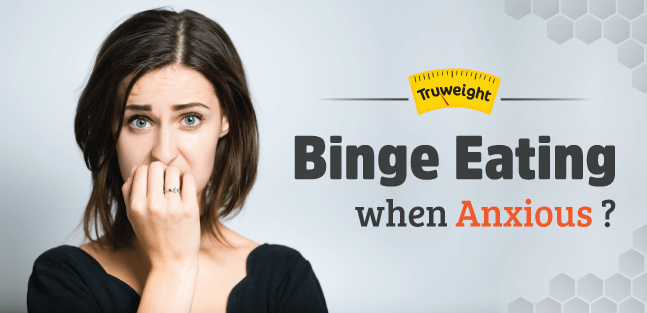Anxiety is a very common feeling which we experience from time to time. This feeling can be worry, fear, nervousness or uneasiness about something which we are not certain or sure of the consequences.
It goes off after the event. Anxiety disorder is a mental health disorder in which such feelings are so strong that they interfere with our daily activities.
The common symptoms of anxiety disorders are stress that is more than normal, inability to stop worrying about something and restlessness. They cause panic attacks, post-traumatic stress disorder and obsessive-compulsive disorder.
Table of Contents
- What is Binge Eating Disorder?
- Causes of Binge Eating Disorder
- Treatment for Binge Eating Disorder
- Eating disorders in Men
- Anorexia and Bulimia
- Signs of Anorexia
- Signs of Bulimia Nervosa
All the disorders can be treated with counselling and medication.
Antidepressant medicines also help in overcoming them. One of the obsessive-compulsive disorders is binge eating disorder.
What is Binge Eating Disorder?
Binge eating disorder is a severe, life-threatening but treatable eating disorder characterized by compulsive overeating or eating abnormal amounts of food, quickly and to the point of feeling uneasy.
People lose control over themselves while bingeing so they experience guilt, shame or distress afterwards. It is the most common eating disorders in the USA though it is catching up in India and in other countries as well. It can occur in men and women of normal weight.
When binge eating goes unchecked it results in weight gain and obesity. Obesity leads to depression which in turn leads to binge eating. People suffering from it struggle with emotions of guilt and shame leading to anxiety.
To cope with anxiety people eat more and more thus creating a vicious cycle.
Causes of Binge Eating Disorder
Though the exact causes are not known there seems to be a variety of factors that influence binge eating disorder. They are:-
1.Psychological factors
A strong connection is seen between binge eating and depression. Low self-esteem, not happy with one’s looks and body, not doing well academically, being bullied in school or college and having difficulty coping with certain feelings lead to binge eating.
2. Biological factors
Genetic changes or hormonal irregularities cause binge eating.
3. Cultural and social
Traumatic situations in their life, social pressures to look thin and adverse comments about their body shape or weight can cause binge eating. People with binge eating disorder are often ashamed of their eating habits hence they do not let others know about them.
Here are some signs and symptoms to identify them.
- Such people eat normally in the presence of others but gorge when they are alone.
- Continue to eat even when they know that their stomach is full.
- They have no control over food and so they cannot stop eating.
- Load their plate with large quantities of food when others are not watching them and consume them secretly.
- Experience feelings of stress and anxiety which can be relieved only by eating.
- Lack of sensation and feel numb while they binge on food.
- No idea of satiation and they are never satisfied with either the quality or the quantity of food that they consume.
The consequences of binge eating disorder cause many complications. People experience psychological, physical and social difficulties. Depression, anxiety, insomnia, bipolar disorder, sleep apnea and hypertension are major ones.
Health problems like muscle and joint pains, Type 2 diabetes, cardiovascular diseases, gastrointestinal problems and gallbladder disease arise owing to binge eating.
Treatment for Binge Eating Disorder
Psychiatrists, Nutritionists and Therapists can treat a binge eating disorder.
A Psychiatrist first observes and then treats by understanding the underlying issues associated with eating disorders such as what triggers binge eating, how to cope with it and how to deal with stress, anxiety and depression.
Therapists use certain therapies to treat binge eating disorders. They are:-
a) Cognitive behavioral therapy
It aims at helping people understand their thoughts and feelings that influence their behaviors.
b) Interpersonal psychotherapy
It focuses on improving the person’s relationship with his family and friends and the way they see themselves.
c) Dialectical behavior therapy
It focuses on teaching individuals, skills to cope with stress and monitor their emotions. Group therapy sessions and support groups also help people to recover from binge eating disorder.
People who have been in this situation before and recovered from it completely will have a better knowledge and understanding of this problem.

They can help others struggling with this disorder by sharing their experiences of how they dealt with it and overcame it. The results can be very positive and encouraging.
Eating disorders in Men
It is a general opinion that eating disorders occur only in women but surprisingly even men suffer from it. They exhibit similar behaviour as women such as binge eating, purging, laxative abuse and fasting for weight loss.
Since they are less likely to seek treatment, their number goes un-noticed due to a misconception that only women have eating disorders. Studies suggest that the mortality rate is higher for males than for females with eating disorders.
So early treatment is essential. The treatment is the same as it for women. Men and boys with anorexia have a high risk of osteopenia and osteoporosis because they usually have low levels of testosterone and Vitamin D. Testosterone supplements should be prescribed.
Anorexia and Bulimia
We should have normal eating habits to stay healthy. Some people resort to eating too much or too little and use harmful ways to get rid of calories thus damaging their health. These are called eating disorders. People with eating disorders always worry about their weight and their appearance and how to avoid taking in the calories and how to get rid of them.
The two common eating disorders are Anorexia Nervosa and Bulimia Nervosa the symptoms of which are often mixed up. People may move from anorexia to bulimia and vice versa. It is seen that girls and women suffer from anorexia and bulimia more than boys and men. Boys and men may develop this disorder owing to over-exercising.
Signs of Anorexia
- Worry a lot about your weight and want to lose it in spite of having the right weight for your age and height.
- Cannot stop thinking about food as you are always hungry.
- Start counting calories and eat as less as you can and then use slimming pills or over-exercise to burn off the calories.
- Smoke more and chew gum to keep your weight down.
- Avoid eating at lunchtime and avoid attending social gatherings and fall sick if you eat in excess.
- Drink lots of water before checking your weight and wear loose clothing to cover your body shape and appearance and lie about your weight.
- Menstrual periods become irregular or stop in girls and women.
- Develop rigid and obsessive habits like working all the time.
Anorexia starts in the teenage years but people of any age can have it.
Signs of Bulimia Nervosa
- You worry more and more about your weight.
- Binge eat.
- Make yourself vomit forcefully and use laxatives or other methods to get rid of the calories.
- Feel tired and guilty.
- Have irregular menstrual periods.
- Weight stays constant despite your efforts to diet and to bring it down.
Bulimia Nervosa also starts in the teenage years and people can remain unwell for many years if they do not seek help. More women than men suffer from it. Frequent binge eating and purging damages the body severely and causes the stomach to rupture. Purging may result in heart failure due to a vital loss of minerals.
People who struggle with binge eating disorders get attracted to certain foods that trigger binge eating. They lose control over themselves when they see foods rich in carbohydrates and fats. They also get excited about seeing their favourite food.

Their brain releases a hormone called serotonin on spotting them. Serotonin gives them a feeling of excitement and joy. Hence people find it so difficult to come out of the disorder as they get attracted towards such foods for sheer joy and happiness and to escape from unhappy situations and stress.
Eating for comfort or for emotional reasons is not necessarily a bad thing but when food becomes the only source of comfort to deal with stress or with emotional insecurities, then it is asking for trouble.
Using food to overcome emotional challenges in life can quickly turn into a binge order-disorder.
Most of us, at some point in our lives, have indulged in binge eating with friends and family during holidays or in school and college life for sheer fun. It was adventurous too, to steal a snack and eat in the middle of the night.
We should ensure that such fun does not develop into a habit and cause a disorder. Night eating is another type of disorder when an individual wakes up in the night and cannot sleep without eating even though he or she is not hungry.
Who frequently eat in hotels and restaurants have to struggle a lot to control binge eating. With the choice and the quantity of food available there, it makes them very difficult to keep away from them.
Let not binge eating become a disorder. If you can identify it, seek help as soon as you can to lead a good and healthy life.

Wow amazing blog post thank you so much!
Hi Marii! We are glad that you liked our blog. Keep following our blog to know more health information.
Binge eating looks like an frustrated monkey. Many people who are food lovers, will be addicted to binge eating. Interesting article. Kindly know
Hi! We are glad that you found our article is interesting. It explains about binge eating and how to come over it. Keep following our blog to know more health information.
Thanks so much for this amazing information post!!!
Hi Jesus! You are welcome, this article explains about anxiety and will it lead to binge eating and how to come over it. Keep following our blog to know more health information.
Hey just wanted to let you know I deal with anxiety and realized I’d binge eat everyday
Hi Tim! We would like to inform you that our article helps you to come over anxiety attack. Keep following our blog to know more health information.